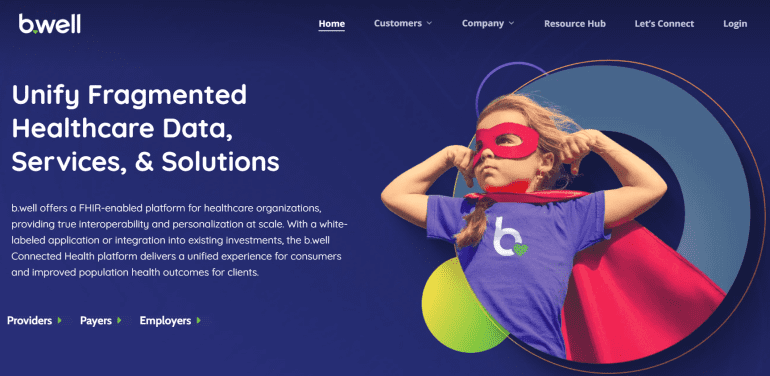- b.well Connected Health has launched a new configurable AI architecture integrated into its FHIR-based platform.
- The AI offering is backed by a comprehensive longitudinal dataset to accelerate AI adoption in healthcare.
- Many healthcare organizations lack the infrastructure for AI development; only 25% have dedicated AI teams.
- b.well’s architecture allows for seamless integration of AI into existing workflows and offers customization.
- AI capabilities include natural language search for improved care access, large language models for personalized health insights, and a recommendation engine for cost-effective care options.
- The platform ensures security and privacy with HITRUST certification and IAL2-certified identity proofing.
- The new technology aims to streamline complex healthcare systems and enhance operational efficiency.
Main AI News:
b.well Connected Health, a leader in platform-enabled healthcare ecosystems, has unveiled a new configurable AI architecture embedded within its FHIR-based platform. This innovation, supported by a comprehensive longitudinal dataset, aims to expedite AI adoption across various healthcare applications while upholding essential standards of trust, security, compliance, and patient safety.
Many healthcare providers struggle with the lack of adequate data infrastructure and resources to develop and manage AI solutions. Deloitte reports that only 25% of healthcare organizations possess a dedicated team for AI model maintenance. The new AI architecture from b.well offers a solution by integrating AI directly into existing workflows and allowing customization according to organizational needs.
“b.well aims to replicate the transformative impact of cloud technology on data centers with our new AI model. Our ‘buy-then-innovate’ approach accelerates AI adoption, making it more scalable, adaptable, and cost-effective,” stated Imran Qureshi, Chief Technology Officer at b.well Connected Health.
With b.well’s infrastructure, healthcare providers can enhance their AI strategies to:
- Improve care access: Natural language search features enable users to seek care using simple phrases like “I have stomach pain” or “find a kidney specialist.”
- Summarize and analyze health data: Large language models (LLMs) use comprehensive health histories to offer personalized recommendations and insights.
- Guide users to cost-effective options: A recommendation engine with geofencing suggests lower-cost care and generic alternatives to help save money.
“With over 8 million non-physician healthcare workers and more than 50 million family caregivers in the U.S., along with countless consumers, b.well’s AI approach will enhance user interactions and automate tasks currently performed manually, driving efficiency at scale,” Qureshi added.
The AI features are built on b.well’s unified data system, which consolidates data into FHIR format, enhances it with insights from over 60,000 consumer connections, and provides actionable, personalized recommendations.
The b.well Connected Health Platform includes robust security measures, including HITRUST certification and IAL2-certified identity proofing, to ensure privacy and trust. This commitment to security allows healthcare organizations to swiftly implement AI technologies while maintaining high standards of safety and effectiveness.
“AI has the potential to simplify the complex healthcare system. Our scalable technology enables healthcare organizations to innovate their workflows now, without the need to develop solutions from scratch,” said Kristen Valdes, Founder and Chief Executive Officer of b.well Connected Health.
Conclusion:
b.well Connected Health’s introduction of its scalable AI architecture represents a significant advancement in the healthcare technology market. By integrating AI capabilities directly into existing workflows and offering customizable solutions, b.well addresses critical gaps in data infrastructure and AI resources among healthcare organizations. This move is expected to accelerate AI adoption, improve patient care accessibility, and optimize cost efficiency in healthcare settings. As organizations leverage this technology, the market may see increased innovation and a shift towards more efficient, data-driven healthcare solutions.

